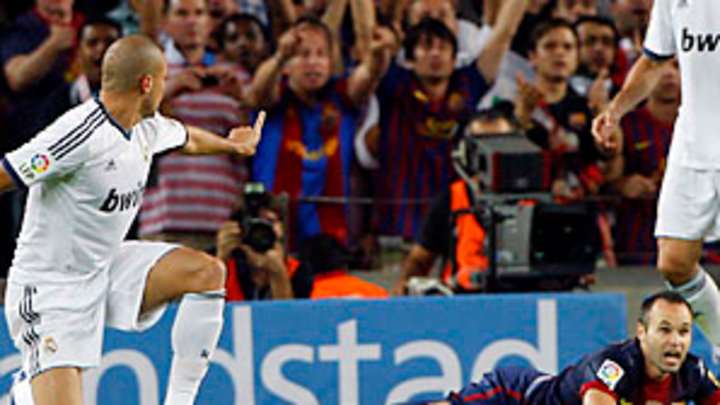Iniesta-Pepe feud creates Spanish buzz, headlines days after Clásico

It had all gone a little too well. When the final whistle blew on the Clásico, there were no fights, no one stormed off and no one pursued the referee from the pitch. No one raced to occupy the moral high ground, either.
Instead, players from Real Madrid and Barcelona embraced, from Marcelo and Adriano to Lionel Messi and Iker Casillas. It had finished 2-2: both teams had the same number of goals, the same number of shots, the same number of saves, the same number of shots off the post and the same number of penalty claims made and ignored. Even that other battle finished level: there were two goals each for the stars, Cristiano Ronaldo and Messi, definitively installed as the world's best players, two of the finest ever.
Everyone was happy. On the face of it, at least. Both sets of players and both sets of fans were satisfied. It had been some game -- "memorable!" as one front page put it, "a match to make you proud." No controversy or sense of injustice, just two very, very good teams and two astonishing, epoch-defining players. Even the politics were momentarily forgotten, overtaken by the brilliance of the football.
But then it happened. Down in the mixed zone after the game, Pepe was asked about the penalty incident in which he challenged Andres Iniesta, and the seed was sown. Pepe insisted that it was not a penalty. "We know what they're like," he said. "We know that Barcelona's players are teatreros." Actors. It was a striking remark -- particularly coming from Pepe, a man not exactly well placed to hand out lessons about on-field behavior, including diving.
By then Jose Mourinho had been and gone, declaring it the kind of game that everyone can enjoy, but because it took Tito Vilanova so long to arrive there was time to relay Pepe's words to him. "What," he was asked, "do you think?"
Vilanova's eyes widened. He could have chosen to ignore it, leaving Pepe a lone voice; he chose not to. "If we're going to talk about things that happen in the game let's talk about all of them," he said. "With Pepe's actions, his kicks, we could put together a [whole] video. Pepe? What's Pepe going to say?!"
On Monday morning, Pepe and Vilanova's remarks didn't dominate the agenda. How could they after what Messi and Ronaldo had just done? There was so much good stuff to talk and write about and it had happened late, too -- it was close to 11 p.m. by the time Vilanova spoke. Pages had already been filled. But soon, the argument did come center stage, and when it did, it grew and grew. Soon, the debate, if you could even call it that, slipped into familiar territory and into familiar trenches: point-scoring and paranoia in the press. You could almost sense the glee as editors on both sides of the divide realized what they had in their hands.
The next morning, Diario AS led with a statistical report that argued that Pepe is not so bad -- just a dog with a very bad name. His video nasty would not be so nasty. It was, to use the Spanish phrase, a "face wash," an attempt to clean up his image. Other players committed more fouls, they said: although the stats drew no distinction between fouls made and fouls blown, nor between types of fouls, they showed that almost half of those on the pitch during the Clásico had committed more fouls than Pepe over the last year. On the other side of the divide, they ran photos as if from a showreel of Pepe's worst moments, from treading on Messi's hand to his assault, and "assault" really is the word, of Getafe's Javi Casquero -- moments of a violence so extreme as to be almost cartoonish.
The arguments were not exactly highbrow. The headline on the cover of El Mundo Deportivo ran: "shut up Pepe!" Sport went for a photo of Messi above one of Pepe. "King of football ... King of kicking people," ran the headline. No prizes for guessing who was who. Meanwhile, one paper published a series of photos that "proved" that the referee had favored Barcelona and another published a series of photos that "proved" that the referee had favored Madrid. Again, no prizes for guessing which was which.
That evening, Iniesta sat in a conference room at the Spanish Football Federation HQ at Las Rozas, where he gave an interview to Onda Cero radio. He spoke evenly, understatedly as ever, but the message he delivered was a clear one. "Pepe can express the opinion that it is not a penalty but no more than that," he said. "To suggest that [I dived] is offensive and hurts. I am not teatrero and nor are my teammates. And if we looked at all Pepe's actions we'd have ... opinions."
"We all know Pepe," he concluded.
The following day, Pepe was with the Portugal squad. Asked about Iniesta's remarks, he replied: "He's hurt? Yes, that's because the truth hurts."
The truth? Since when has the truth had anything to do with it?
